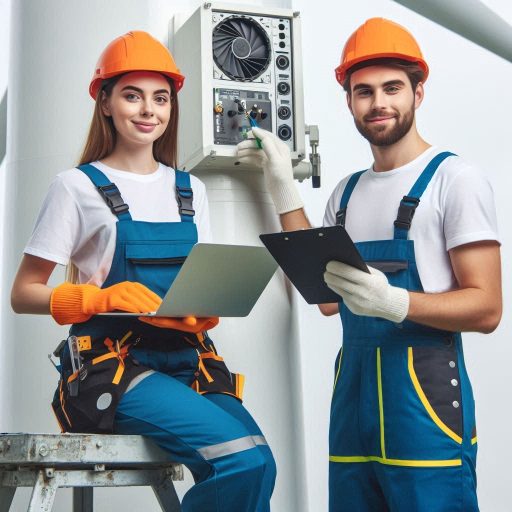Introduction
Importance of preparing for a job interview as a wind turbine technician
Preparing for a job interview as a wind turbine technician is crucial for success.
Thorough preparation shows your commitment and readiness for the role.
This field is highly competitive, and many qualified candidates are vying for positions.
Competitive nature of the job market in this field
The job market for wind turbine technicians is competitive.
With advancements in renewable energy and increasing demand, employers seek candidates with both technical skills and practical experience.
Standing out requires more than just technical knowledge; it demands strong preparation and confidence.
Significance of being well-prepared and confident during the interview process
Being well-prepared allows you to address technical questions with clarity and confidence.
Practice answering common technical questions related to maintenance and troubleshooting.
Show that you understand the industry’s requirements and have hands-on experience.
Preparation also helps you ask insightful questions about the company’s technology and practices.
Overall, thorough preparation and confidence are key to making a strong impression and securing the job.
Overview of typical job interview questions for wind turbine technicians
Common Technical Questions Related to Maintenance and Troubleshooting
In a wind turbine technician job interview, anticipate a range of technical questions that assess your knowledge and experience.
Commonly asked questions include:
- “How do you perform routine inspections on wind turbines?” This question tests your understanding of standard procedures for checking turbine components.
- “What steps do you take to troubleshoot a malfunctioning generator?” Here, interviewers want to gauge your problem-solving skills and troubleshooting methods.
- “Can you describe the process for calibrating turbine sensors?” This question evaluates your familiarity with sensor calibration, crucial for accurate turbine performance.
- “How do you handle a situation where a turbine is producing lower than expected power output?” This assesses your ability to diagnose and address power generation issues.
- “What tools and equipment do you use for blade inspection and repair?” Your response should reflect your knowledge of the tools necessary for effective blade maintenance.
Importance of Demonstrating Knowledge and Experience in the Field
Demonstrating a strong grasp of wind turbine maintenance and troubleshooting is essential.
Your responses should not only reflect theoretical knowledge but also practical experience.
Interviewers seek candidates who can confidently discuss hands-on tasks and solutions.
Emphasizing familiarity with industry standards and best practices will distinguish you from other candidates.
Showcasing your ability to apply theoretical concepts to real-world problems is critical.
Tips on How to Best Answer Technical Questions Effectively
Prepare Thoroughly
Before the interview, review common maintenance and troubleshooting procedures.
Familiarize yourself with technical terminology and current industry practices.
This preparation ensures that you can discuss your experience confidently and accurately.
Be Specific
Provide detailed examples from your past work experiences.
When asked about maintenance or troubleshooting, describe specific situations where you successfully handled tasks.
Mention the issue, the steps you took to resolve it, and the outcome.
Specificity demonstrates your practical knowledge and problem-solving abilities.
Stay Calm
Interviews can be stressful, but it’s important to remain composed.
Take a moment to gather your thoughts before answering.
Clear, thoughtful responses are more effective than rushed answers that may contain errors.
Use Structured Responses
Employ a structured approach when answering questions.
For instance, use the STAR method (Situation, Task, Action, Result) to describe your problem-solving process.
This method helps convey your approach clearly and effectively.
Show Enthusiasm
Express genuine interest in wind turbine technology and maintenance.
Enthusiasm for the field can set you apart from other candidates.
Employers appreciate candidates who are passionate and motivated about their work.
Discuss Industry Trends: Demonstrate awareness of the latest trends and technologies in wind turbine maintenance.
Discussing advancements in the field shows that you are committed to staying updated and continuously improving your skills.
Highlight Safety Practices
Emphasize your commitment to safety protocols and regulations.
Wind turbine maintenance often involves working in challenging environments, so showing that you prioritize safety can reassure employers of your reliability.
Ask Insightful Questions
Prepare thoughtful questions to ask the interviewer.
Inquire about the company’s approach to maintenance, the tools and technologies they use, and opportunities for professional development.
This demonstrates your proactive attitude and genuine interest in the role.
By preparing for these questions thoroughly and following these tips, you will enhance your performance in a wind turbine technician interview.
Your ability to articulate your technical knowledge, problem-solving skills, and passion for the field will help you stand out as a strong candidate.
Read: Radiologic Technologist: Work Environment Insights
Behavioral interview questions specific to wind turbine technicians
Significance of Behavioral Questions
Behavioral questions are crucial in evaluating a candidate’s suitability for the role of a wind turbine technician.
These questions delve into past experiences to predict future performance.
They provide insight into how candidates handle real-world challenges, interact with team members, and approach problem-solving.
Behavioral questions help employers assess essential qualities such as teamwork, resilience, and communication skills.
By asking for specific examples from past experiences, these questions reveal how candidates have navigated complex situations and their effectiveness in similar roles.
Understanding a candidate’s past behavior helps employers gauge how well they will fit into the company culture and handle the demands of the job.
Examples of Behavioral Questions
- Teamwork: “Can you describe a time when you worked on a team project to fix a turbine issue? What was your role, and how did you contribute?” It reveals your teamwork skills, willingness to support colleagues.
- Problem-Solving: “Tell me about a challenging problem you encountered during maintenance.
How did you approach and resolve it?” - Communication Skills: “Give an example of a time when you had to explain a complex technical issue to a non-technical team member. How did you ensure they understood?”
Advice on Showcasing Relevant Experiences and Skills
To excel in answering behavioral questions, it’s essential to prepare thoroughly and present your experiences effectively.
Use the STAR method (Situation, Task, Action, Result) to structure your answers.
This method helps in articulating your experiences clearly and demonstrating your impact.
- Preparation: Reflect on your previous roles and experiences related to wind turbine maintenance.
Tailor these examples to align with the key responsibilities and challenges of a wind turbine technician role. - Be Specific: When answering behavioral questions, provide detailed and specific examples rather than general statements.
- Practice Responses: Rehearse your responses to common behavioral questions. Practice speaking clearly and confidently about your experiences.
- Show Enthusiasm: Demonstrate your passion for the wind turbine technician role and the renewable energy sector.
- Highlight Skills: Emphasize skills relevant to the wind turbine technician role, such as technical expertise, problem-solving abilities, safety awareness, and teamwork.
- Adaptability: Be prepared to discuss how you adapt to changing conditions and new technologies in the field.
Final Thoughts
Behavioral questions provide valuable insights into a candidate’s suitability for a wind turbine technician position.
By preparing specific examples, practicing responses, and demonstrating enthusiasm, you can effectively showcase your skills and experiences.
Approach the interview with confidence and clarity to leave a strong impression on potential employers.
Understanding the significance of these questions and preparing thoroughly will help you navigate the interview process successfully and advance your career in wind turbine maintenance.
Read: Continuing Education for Radiologic Technologists
Personal and situational questions commonly asked during wind turbine technician job interviews
Importance of Personal Attributes and Cultural Fit
When hiring wind turbine technicians, employers place significant emphasis on personal attributes and cultural fit.
These factors are as crucial as technical skills.
Technicians must not only possess the required skills but also align well with the company’s values and work environment.
Attributes such as reliability, teamwork, and adaptability are vital for success.
A good cultural fit ensures that the technician integrates well with the team and contributes positively to the work atmosphere.
Employers often assess these qualities through various interview questions and scenarios.
Examples Of Situational Questions Related To Safety, Decision-Making, And Adaptability
Preparing for Safety-Related Questions
Safety is a major concern in wind turbine maintenance.
Be ready to discuss your knowledge of safety procedures and protocols.
Highlight your experience with safety training and adherence to guidelines.
Employers want to see that you prioritize safety and understand its importance in preventing accidents.
Transform Your Career Today
Unlock a personalized career strategy that drives real results. Get tailored advice and a roadmap designed just for you.
Start NowShowcasing Decision-Making Skills
When answering questions about decision-making, illustrate your ability to analyze situations and make informed choices.
Provide examples of past decisions made under pressure and their outcomes.
Emphasize your ability to evaluate risks and benefits effectively.
Demonstrating Adaptability
Adaptability is key in a dynamic field like wind turbine maintenance.
Share examples of how you adjusted to unexpected changes or challenges.
Highlight your flexibility and willingness to learn new techniques or technologies.
Show that you can quickly adapt to evolving work conditions and challenges.
Most importantly, before the interview, research common questions and practice your responses.
Prepare to discuss both technical skills and personal attributes.
Show enthusiasm for the role and the company.
By focusing on these areas, you will be well-prepared to demonstrate your suitability for the wind turbine technician position.
In summary, a successful interview for a wind turbine technician position involves highlighting personal attributes, answering situational questions effectively, and demonstrating a good cultural fit.
Prepare thoroughly to showcase your skills, adaptability, and commitment to safety.
Examples Of Situational Questions
Behavioral questions are crucial in determining if a candidate is a good fit for the role.
They help interviewers understand how candidates have handled situations in the past, providing insight into their problem-solving, teamwork, and communication skills.
These questions reveal how a candidate’s experiences align with the job requirements and the company’s culture.
Behavioral questions also predict future performance by assessing past behavior and decision-making processes.
Candidates’ responses to these questions demonstrate their ability to handle challenges and work effectively within a team.
Examples of Behavioral Questions
Situational questions help evaluate how candidates handle real-world challenges.
For example, “Describe a time when you had to collaborate with a difficult team member.
” This question assesses teamwork and interpersonal skills.
Another example is, “Can you share an instance where you solved a complex problem under pressure?” This tests problem-solving abilities and resilience.
Lastly, “Give an example of how you communicated a technical issue to a non-technical person.
” This evaluates communication skills and the ability to convey complex information clearly.
Read: Common Mistakes in Quality Control Inspections

The importance of preparing questions to ask the interviewer
Asking Thoughtful Questions Demonstrates Interest and Engagement
In a wind turbine technician job interview, asking thoughtful questions shows genuine interest and engagement in the role.
It signals that you have researched the company and understand the job requirements.
It also reflects your eagerness to be involved and proactive in your potential new role.
Engaged candidates are often perceived as more motivated and committed.
Thoughtful questions help you gather important information about the company and role, helping you decide if it’s the right fit.
Demonstrating curiosity and preparation can set you apart from other candidates and leave a positive impression.
Examples of Insightful Questions to Ask
When interviewing for a wind turbine technician position, consider asking questions about the company, team, and job responsibilities.
For example:
- Company and Culture: “Can you describe the company’s approach to maintaining a positive work environment?”
- Team Dynamics: “How does the team collaborate on complex maintenance projects?”
- Job Responsibilities: “What are the most common challenges faced in this role?”
These questions provide insights into the company’s culture and team dynamics.
They also help you understand the specific responsibilities and expectations of the position.
Additionally, asking about challenges can reveal the practical aspects of the job and how the team addresses them.
Tailoring Questions to the Specific Job Opportunity
To tailor your questions to the specific job opportunity, review the job description and company background carefully.
Identify key aspects of the role that you want to explore further.
For instance, if the job description highlights the use of advanced technology, you might ask, “What types of technologies are most frequently used in maintenance tasks here?”
If the company emphasizes growth opportunities, inquire, “What career development opportunities does the company offer for technicians?”
Tailoring your questions shows that you are not only interested in the job but also in how you can grow and contribute within the company.
To summarize, asking thoughtful questions during a wind turbine technician job interview is crucial.
It demonstrates your genuine interest and engagement, setting you apart from other candidates.
By asking insightful questions about the company, team, and job responsibilities, you gather valuable information to make an informed decision.
Tailoring your questions based on the job description and company background ensures that you address relevant aspects of the role.
This approach helps you evaluate if the position aligns with your career goals and how you can best contribute to the team.
Read: Environmental Engineering Software and Tools
Tips for successful job interviews as a wind turbine technician
The Importance of Practicing and Rehearsing Responses
Practicing and rehearsing responses to common interview questions is crucial for wind turbine technician candidates.
Prepare answers to questions about your technical skills, problem-solving abilities, and experience with turbine maintenance.
Rehearse responses to scenarios involving safety protocols and troubleshooting methods.
Practice with a friend or in front of a mirror to build confidence and refine your answers.
This preparation helps you articulate your qualifications clearly and effectively.
Mock interviews can simulate real interview conditions, helping you become familiar with the process.
By anticipating questions and rehearsing your responses, you present yourself as a well-prepared and competent candidate.
Significance of Professional Attire, Body Language, and Communication Skills
Professional attire is essential for making a positive first impression.
Dress in appropriate work attire, such as a clean, pressed shirt and trousers, to convey seriousness about the role.
Your body language also plays a significant role; maintain good posture, make eye contact, and offer a firm handshake.
Effective communication skills are critical; speak clearly and confidently, and listen actively to the interviewer.
Avoid fidgeting and be mindful of your non-verbal cues, as they reflect your professionalism and confidence.
Demonstrating strong communication skills shows that you can interact effectively with team members and supervisors in a work setting.
The Need to Research the Company and the Role Thoroughly
Thorough research about the company and the role is essential before the interview.
Understand the company’s mission, values, and recent projects related to wind turbine technology.
Familiarize yourself with the specific requirements and responsibilities of the wind turbine technician role.
Researching the company demonstrates your genuine interest and enthusiasm for the position.
It also enables you to tailor your responses to align with the company’s needs and culture.
Prepare thoughtful questions about the company’s operations and the team you’ll be working with.
This preparation shows that you are proactive and have a strong interest in contributing to the organization.
Showcase Your Technical Knowledge and Skills
Highlighting your technical expertise during the interview is vital.
Be ready to discuss specific tools and technologies you have worked with.
Demonstrate your understanding of wind turbine mechanics, maintenance procedures, and safety protocols.
Share examples of successful projects or troubleshooting experiences.
Your ability to discuss technical details confidently will reassure the interviewer of your qualifications.
Discuss Your Problem-Solving Abilities
Employers value candidates who can effectively solve problems.
Be prepared to describe how you have tackled challenges in previous roles.
Explain your approach to diagnosing and resolving technical issues.
Provide examples that showcase your analytical thinking and problem-solving skills.
This will demonstrate your ability to handle the complexities of wind turbine maintenance.
Behavioral questions assess how you handle specific situations.
Prepare for questions about teamwork, conflict resolution, and managing stress.
Use the STAR method (Situation, Task, Action, Result) to structure your answers.
This approach helps you provide clear and concise responses, illustrating your experience and skills effectively.
Successfully navigating a wind turbine technician job interview requires practice and preparation.
Rehearse your responses, dress professionally, and focus on strong communication skills.
Research the company and role thoroughly to demonstrate genuine interest.
By showcasing your technical knowledge, problem-solving abilities, and behavioral competencies, you present yourself as a strong candidate ready to excel in the position.
Conclusion
Preparing for a wind turbine technician job interview requires a focus on behavioral questions.
These questions are crucial for assessing how well you fit the role.
They often cover areas such as teamwork, problem-solving, and communication skills.
Specific examples from your past work experience can demonstrate your qualifications effectively.
Behavioral questions might ask you to describe a time when you had to resolve a complex issue or work with a team under pressure.
Use the STAR method—Situation, Task, Action, Result—to structure your responses.
This method helps in providing clear and concise answers that showcase your skills and achievements.
Preparation and confidence are key to succeeding in your interview.
Review common questions, practice your answers, and reflect on your relevant experiences.
Highlight how these experiences align with the job requirements.
Show enthusiasm for the role and the renewable energy sector to make a positive impression.
By utilizing these tips and preparing thoroughly, you will be well-equipped to excel in your next interview.
Your ability to effectively communicate your skills and experiences will greatly enhance your chances of securing the position.




